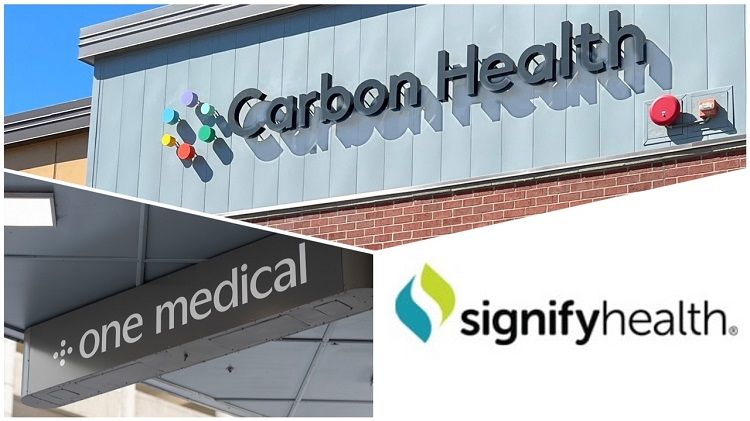
Retailers and payors are transforming how the U.S. receives care
The primary care market is seeing consolidation like never before. Retail and payor commercial healthcare providers (CHPs) are acquiring and investing in tech-based startups and senior-focused providers in response to changing patient demographics and preferences.
Amazon, CVS Health, Walgreens, Walmart and others are a non-traditional cast having an evident impact on primary care. These retailers and payors such United Health Group and others are at the forefront of partnerships permeating the primary care landscape today. Redefining the market share is a shift from fee-for-service to fee-for-value reimbursement models, physician shortages, consumerism and digital disruption.
According to Bain & Company’s 2022 Frontline of Healthcare Study, 80% of physicians say they want to provide value-based care, but their interest declines as the risk of doing so grows. Enter technology CHPs like Maryland-based Aledade, which works with 1,500 independent primary care practices and health centers and acquired analytics company Curia this year. Curia uses AI to find risk gaps and predict the chances of adverse health outcomes in patients. It’s a valuable niche.
Retail CHP acquisitions
Retail CHPs like CVS Health have scooped up technology CHPs like Dallas-based Signify Health for $8 billion this year. Signify Health’s mission is to champion alignment to unite a fragmented healthcare ecosystem by delivering more connected, intuitive and effective care.
But CVS Health hasn’t stopped there. It also acquired senior-focused CHP Oak Street Health, which has over 100 primary care doctor’s offices across 25 states and expects 300 locations by 2026, for $10.6 billion. Oak Street Health operates as a multi-payor primary care provider as part of CVS Health.
Retail CHPs are focused on meeting patients where they are with in-home, in-store and virtual care services as well as in primary care offices. This corporatization of primary care is expected to only be the first wave. Bain & Company predicts that 30% of U.S. primary care will be owned by these non-traditional players by 2030.
These population-specific models will grow nationally in an effort to mitigate administrative complexity for clinicians. Bain & Company predicts 15% of the market will be owned by payors and payor-owned services, while 5% to 10% of the market will be owned by retailers.
Patient preference
Meanwhile, virtual health is being embraced by younger, healthier patients and is anticipated to ascend to 20% market penetration by 2030. And while fee-for-service is still predicted to be the largest model, alternative models are forecasted to take 15% to 20% of its market share.
Startup Carbon Health recently partnered with CVS Health to pilot its primary and urgent care clinic model in CVS stores. This led to a $100 million investment in Carbon Health’s expansion to new markets. Carbon Health has 125 physical clinics in 13 states and provides care for over 1 million patients.
CVS operates over 9,000 retail locations in the U.S. and will leverage Carbon Health’s model in its stores. This is just the next step in healthcare for CVS Health as it owns health insurer Aetna and pharmacy benefits manager Caremark, and it acquired technology CHP Signify Health and senior-focused CHP Oak Street Health.
Healthcare is a fragmented system in the U.S. and the primary care market plays an invaluable role in coordination. In today’s changing landscape for primary care, these non-traditional investors could catapult healthcare innovation that touches all Americans, including underserved and diverse populations.
The IDN Directory, The Journal of Healthcare Contracting, and Repertoire Magazine and the will be covering all aspects of this changing market in 2023 and beyond!
About the IDN Directory
The IDN Directory is the go-to resource for Health Care Suppliers who want the latest insights and information about the largest health systems in the U.S. and their supply chain leaders.
More than just a database, the IDN Directory’s supply chain-focused content provides sales reps with a clear and comprehensive idea of their customers’ supply chain needs and activities, empowering them to achieve success with GPO, Direct, and Regional contracting.
To request a live demo of the IDN Directory, email us at Demo@IDNDirectory.com.
